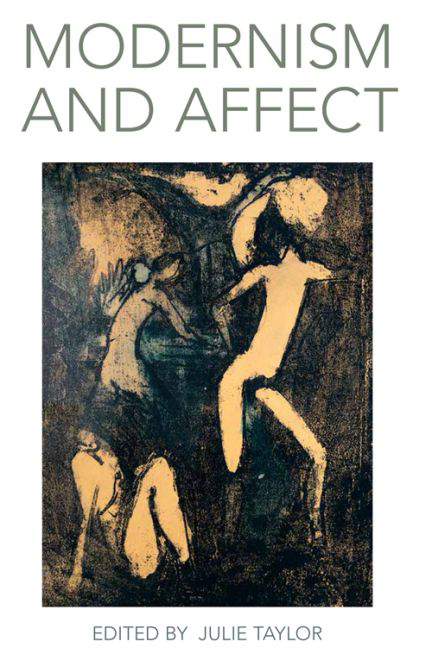Book contents
- Frontmatter
- Contents
- List of Illustrations
- Acknowledgements
- Notes on Contributors
- Introduction: Modernism and Affect
- 1 Mind, Body and Embarrassment in Henry James's The Awkward Age
- 2 The Trauma of Form: Death Drive as Affect in À la recherche du temps perdu
- 3 Logic of the Heart: Affective Ethical Valuing in T. E. Hulme and Max Scheler
- 4 The Line that Binds: Climbing Narratives, Ropework and Epistolary Practice
- 5 The Amplification of Affect: Tension, Intensity and Form in Modern Dance
- 6 Love and the Art Object
- 7 Animating Cane: Race, Affect, History and Jean Toomer
- 8 Fear and Precarious Life after Political Representation in Baudelaire
- 9 Bloom-Space of Theory: The Pleasure and the Bliss of Gerty MacDowell
- 10 From Odysseus to Rotpeter: Adorno and Kafka, Mimicry and Happiness
- 11 Making Happy, Happy-making: The Eameses and Communication by Design
- Index
Introduction: Modernism and Affect
Published online by Cambridge University Press: 15 September 2017
- Frontmatter
- Contents
- List of Illustrations
- Acknowledgements
- Notes on Contributors
- Introduction: Modernism and Affect
- 1 Mind, Body and Embarrassment in Henry James's The Awkward Age
- 2 The Trauma of Form: Death Drive as Affect in À la recherche du temps perdu
- 3 Logic of the Heart: Affective Ethical Valuing in T. E. Hulme and Max Scheler
- 4 The Line that Binds: Climbing Narratives, Ropework and Epistolary Practice
- 5 The Amplification of Affect: Tension, Intensity and Form in Modern Dance
- 6 Love and the Art Object
- 7 Animating Cane: Race, Affect, History and Jean Toomer
- 8 Fear and Precarious Life after Political Representation in Baudelaire
- 9 Bloom-Space of Theory: The Pleasure and the Bliss of Gerty MacDowell
- 10 From Odysseus to Rotpeter: Adorno and Kafka, Mimicry and Happiness
- 11 Making Happy, Happy-making: The Eameses and Communication by Design
- Index
Summary
From Walter Benjamin's reports of the ‘fear, revulsion and horror’ aroused in early spectators of the metropolitan crowd to Thomas Hardy's depiction of the ‘ache of modernism’, many of our most familiar accounts of modernity attend to its affective qualities (Benjamin 1982: 176; Hardy 1996: 130). It is well documented that modern life produced new shocks, stresses and excitements; new forms of tedium, distress and disappointment – an affective gamut exemplified by figures such as the innervated factory worker, the shell-shocked war veteran and the fervent revolutionary. We are also accustomed to thinking about the contested relationship between the historical phenomenon of modernity and the politics and aesthetics of modernism in broadly affective terms: the modernist art work might be understood as a space for processing or registering new traumas and new delights; as a vehicle to jolt its reader out of quotidian modes of perception; as a mournful or melancholic response to loss or a hopeful indexing of progress. As readers of modernism, we routinely find ourselves affected by its challenging forms; its capacities to bore, to frustrate, and to please. The eleven multidisciplinary chapters in Modernism and Affect invite us to dwell on such matters of affect and to put feeling at the heart of our thinking as we theorise modernism and modernity.
The growing interest in affect within the humanities has drawn our attention to crucial aspects of modernist culture that seem to have been hidden in plain sight: while writing by modernists and their scholars has always been full of feelings, we have been slow to turn a critical eye towards them. However, recent works within modernist studies have suggested foundational links between affect and the structure of the modern itself. Jonathan Flatley has emphasised the melancholia of modernism, arguing that the ‘nowness’ of modernity implies a sense of anteriority that links it fundamentality to loss, while Heather Love has suggested that the ‘backward’ feelings of queer moderns (such as pain, loss, trauma and melancholia) communicate a refusal of progress that highlights one of modernism's central paradoxes: that ‘backwardness is a feature of even the most forward-looking modernist literature’ (Flatley 2008: 29; Love 2007: 6).
- Type
- Chapter
- Information
- Modernism and Affect , pp. 1 - 19Publisher: Edinburgh University PressPrint publication year: 2015

